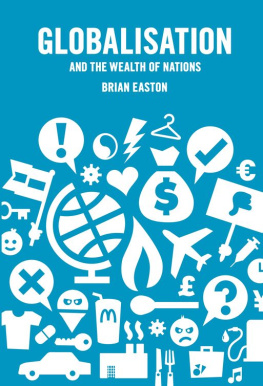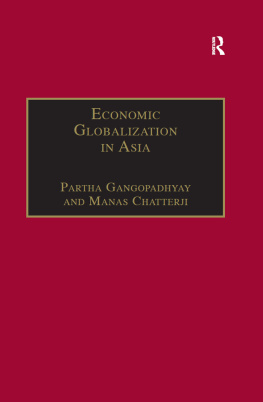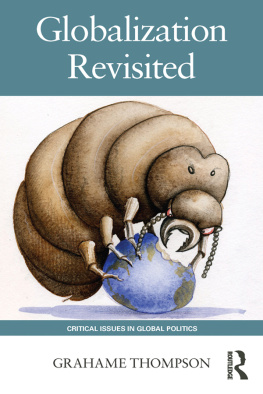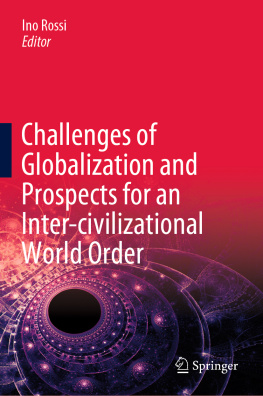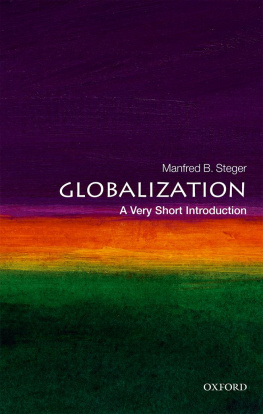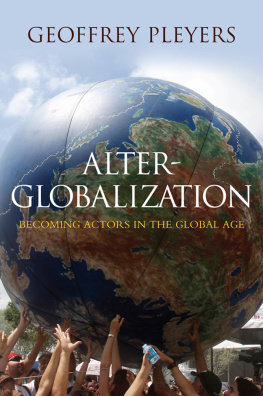Bryan S Turner & Habibul Haque Khondker 2010
First published 2010
Apart from any fair dealing for the purposes of research or private study, or criticism or review, as permitted under the Copyright, Designs and Patents Act, 1988, this publication may be reproduced, stored or transmitted in any form, or by any means, only with the prior permission in writing of the publishers, or in the case of reprographic reproduction, in accordance with the terms of licences issued by the Copyright Licensing Agency. Enquiries concerning reproduction outside those terms should be sent to the publishers.
SAGE Publications Ltd
1 Olivers Yard
55 City Road
London EC1Y 1SP
SAGE Publications Inc.
2455 Teller Road
Thousand Oaks, California 91320
SAGE Publications India Pvt Ltd
B 1/I 1 Mohan Cooperative Industrial Area
Mathura Road, Post Bag 7
New Delhi 110 044
SAGE Publications Asia-Pacific Pte Ltd
33 Pekin Street #02-01
Far East Square
Singapore 048763
Library of Congress Control Number 2009932565
British Library Cataloguing in Publication data
A catalogue record for this book is available from the British Library
ISBN 978-1-4129-2852-6
ISBN 978-1-4129-2853-3 (pbk)
Typeset by C&M Digital (P) Ltd, Chennai, India
Printed in India by Replika Press Pvt. Ltd
Printed on paper from sustainable resources
ACKNOWLEDGEMENTS
We owe a great debt to many for their support and inspiration while writing this book. In many ways, Roland Robertson has been a mentor to both of us.
Some of the arguments in first appeared in Bryan S. Turner (2003) Class, generation and Islamism: towards a global sociology of political Islam, British Journal of Sociology, 54 (1): 13947; (2006) Religion, Theory, Culture & Society, 23 (23): 43744; and Revivalism and the enclave society, in Amyn B. Sajoo (ed.) (2008) Muslim Modernities. Expressions of the Civil Imagination, London: I.B.Taurus, pp. 13760. These passages have all been extensively revised for this book.
of Chris S. Rojek and Bryan S. Turner (2001) Society & Culture, London: Sage. These passages have been extensively revisited and revised.
FOREWORD: THIS MILLENNIAL MOMENT
Roland Robertson
More than fifty years ago the novelist Philip Roth wrote that actuality is continually outdoing our talents and the culture tosses up figures daily that are the envy of any novelist. This observation is even more relevant at the end of the first decade of the twenty-first century than it was in the middle of the twentieth century. Moreover, the comment applies far beyond the realm of novelists. In particular, it certainly applies to many of those who write about globalization. Indeed, by the time this book is published it will, to some extent, inevitably be outdated. This is well demonstrated by the fact that the extent of the so-called economic downturn has only recently become fully evident, in the early months of 2009.
We live at a time when across the globe there are millennial outbursts concerning particular aspects of the human condition, indicating that we are at the beginning of the end. This, in spite of many proclamations, particularly those issuing from medical and pharmaceutical sources, that individual lives can be infinitely extended and most, if not all, diseases cured. The idea of the perfect global storm encapsulates much of this end-time, apocalyptic rhetoric. Among the most important components of the global storm are global warming, water shortage, salination, fuel depletion, pandemics, famine, natural disasters, and demographic changes on a global scale, with attendant problems arising from rapid and extensive migration and the production and reproduction of global diasporas.
In the present book Turner and Khondker seek to provide a new perspective on indeed, a new theory of globalization. This is a highly promising and much needed venture. Here I am concerned primarily to highlight the main contours of the project of theorizing the concept of globalization. Much is made in the literature on globalization of the pivotal significance of interconnectedness sometimes called connectivity. In spite of this clearly evident feature of the modern world, its newness should not be exaggerated. The theme of global interconnectedness is now to be seen in the work of an increasing number of historians. This is a classic example of what David Edgerton has called the shock of the old.
On the other hand, in light of recent global fears and disasters, we can readily agree that connectivity is not the only major dimension of long-term globalization. Specifically, what is missing in this regard is the pivotal feature of increasing or, better, increasingly reflexive global consciousness. While many sociologists if not historians and anthropologists might argue that the latter is a relatively recent characteristic of globalization, this view is not at all realistic. Of particular importance here is the insistence that isolated societies have had no conception of the world. To the contrary, an increasing number of anthropologists have shown that so-called primal peoples have had sophisticated views of the world beyond. The increasingly important theme of alterity is demonstrating this, if only in abstract terms. On the historical front the last few years have seen an increasing number of books by major historians, demonstrating that the world was much more global than recent history has suggested, in the sense of both extensive connectivity and reflexive global consciousness.
In any case, the principle of the shock of the old applies equally to the present global fashion for talking in apocalyptic terms. This can be seen through the ever-growing genre of historical literature claiming that particular periods were more or less unique in their millennial dreams.
The input of historians and the revival of interest in world, or global, history suggests that the major contribution of sociology has, in fact, been to negate globality as a major theme in the understanding of the world; even though, paradoxically and ironically, sociology has been at the forefront of reviving concern with the global, thereby overcoming its classical methodological nationalism, which arose after the deaths of Comte, Saint Simon, and Marx. It must be stressed that this revival has had a relatively long prehistory, exemplified in much of the work of sociologists in the 1960s, in spite of the latter rarely having a full-on interest in globalization. Here again we have another example of the shock of the old, although in this case the old is not very old.
A particularly important feature of contemporary global consciousness is its fractured nature. Currently we find a great mixture of groups arguing for their own interpretations of the worlds planetary troubles. For example, in the G20 demonstrations in London of March 2009 many, often rival, groups were protesting against climate change, against particular kinds of energy, against transnational corporations, against banking systems, inequality and so on. Even though some participants may well have been concerned with the overall picture of a planet in peril, it appears that, on the other hand, each group was, in a certain sense, fundamentalistic. In other words, the tendency seems to have been to reduce a big issue to a much smaller dimension. This is, in fact, what is most plausibly meant by the word fundamentalism the reduction of a cluster of themes to one particular, allegedly master theme. This feature of global consciousness was well demonstrated in the old nuclear disarmament movement, when adherents seemed to believe that if there were a world consensus on the evils of nuclear armaments then all the problems of the world would be solved. Indeed, this reductionist worldview is still to be found in those who argue that globalization is the cause of all of the problems in the world teenage pregnancy, rising rape rates, drug addiction and trafficking, prostitution, gang warfare, even traffic accidents etc. Thus, if present trends continue, we may expect global consciousness to increase but only in this heavily fractured form.


